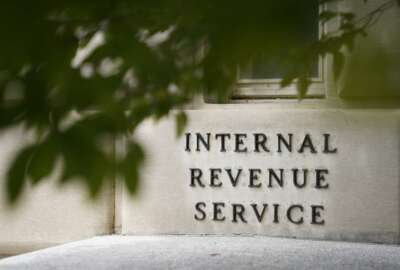
White House expects CR ahead of fiscal 2023, seeks $47B in emergency spending
Best listening experience is on Chrome, Firefox or Safari. Subscribe to Federal Drive’s daily audio interviews on Apple Podcasts or PodcastOne. The Biden...
Best listening experience is on Chrome, Firefox or Safari. Subscribe to Federal Drive’s daily audio interviews on Apple Podcasts or PodcastOne.
The Biden administration, expecting Congress will need more time to pass a comprehensive spending package for fiscal 2023, is requesting $47 billion in emergency funds to last through the end of the calendar year.
Nearly half the funding would go toward the federal government’s response to COVID-19. That includes the rollout of updated booster shots approved this week by the Food and Drug Administration and restarting a program to deliver free COVID-19 rapid tests to households.
The administration is also seeking emergency funding for the first quarter of fiscal 2023 to support its response to the monkeypox outbreak, as well as supporting the war in Ukraine and providing domestic disaster relief.
The White House is providing technical assistance to Congress on a short-term continuing resolution, which includes guidance to lawmakers on funding and legislative adjustments “that are necessary to avoid disruptions to a range of important public services.”
“While Congress has made good progress on annual appropriations bills, it’s also clear that they are going to need to pass a short-term continuing resolution to provide more time for the appropriations process to play out,” an administration official told reporters Friday.
OMB Director Shalanda Young wrote in a blog post Friday that the administration has been working with Congress on the fiscal 2023 funding bills for months.
But with less than one month until the end of the fiscal year, Young said “it’s clear that Congress will first need to pass a short-term continuing resolution (CR) to keep the federal government running and provide the time needed to reach an agreement on full-year funding bills.”
“As is always the case, we understand that Congress will consider additional legislation as part of the CR alongside the funding request we are submitting today, and look forward to working with Congress on those pieces of legislation as they are considered,” Young wrote.
The emergency funding request would cover the first quarter of fiscal 2023, which would last through December. However, an administration official said that “the duration of the CR itself is up to Congress.”
“We hope that they will give themselves enough time to negotiate and reach a bipartisan government funding bill, which is critically important,” the official added.
Much of the $22.4 billion request for COVID spending would accelerate research and development of next-generation vaccines and treatments to prepare for future variants, and to support the global response to COVID.
The funding request is similar to a previous request the White House made in March, but an administration official said the request has been “updated to account for intervening circumstances.”
The latest request is updated to include funding for next-generation COVID booster shots meant to protect against current variants of the virus – including the new, updated Moderna and Pfizer-BioNTech COVID booster shots the FDA approved this week.
An administration official said updated boosters will be free to the public “through the fall into next year,” but the timeline beyond that remains unclear.
“We were always going to have to transition to commercialization, but we’ve had to accelerate the timeline without additional funding. With additional funding, that transition can be dictated by how best to continue protecting the American people against COVID rather than by resource constraints,” the official said.
The administration official added that additional funding would “maximize access” uninsured and underinsured individuals have to COVID vaccines.
Congress passed a $13.6 billion emergency spending bill in March, but stripped out the administration’s request for additional COVID funds. Congressional Republicans have insisted that the administration offset emergency funding requests by repurposing previously appropriated funds.
An administration official said the White House has “been open to having a conversation about offsets,” but said it’s unable to repurpose COVID spending already approved by Congress.
“Every dollar of COVID response is either obligated as being executed or planned for specific purposes. If they do not give us the funding that we’ve asked for, it will force us to make a very difficult tradeoff and pull from existing planned uses to meet the needs of the American people,” the official said.
The administration is also seeking $2 billion to once again provide free at-home COVID tests to households through COVIDTests.gov.
A message on COVIDTests.gov states the program will be suspended on Sept. 2, “because Congress hasn’t provided additional funds to replenish the nation’s stockpile of tests.”
“We have been clear about these funding needs for months and have repeatedly warned that without congressional action, we will be forced to make tradeoffs and pull existing funding from critical efforts to meet pressing needs,” an administration official said.
Postal Service spokesman Dave Partenheimer said USPS has delivered more than 600 million COVID rapid tests since the program launched in January. Households have been able to place three orders for a total of 16 tests.
An administration official said the federal government has some at-home tests remaining in its national stockpile, but without additional funding, it won’t be able to replenish its inventory to prepare for the fall.
“It’s unclear right now exactly how many tests that would buy us,” an administration official said about the $2 billion funding request, “but we don’t have enough funding to get us through a surge in the fall.”
The Biden administration is requesting an additional $13.7 billion to support Ukraine as it defends itself against the Russian military.
To date, roughly three-quarters of the direct military spending Congress previously provided for Ukraine has been disbursed or obligated. The White House expects more funds will be disbursed or obligated before the end of fiscal 2022.
About $7.2 billion of the requested funds would go to the Defense Department, which would spend the majority of the funds on providing equipment to Ukraine. The State Department and USAID would receive $4.5 billion “to support the continuity of government” in Ukraine.
“We’ve rallied the world to support the people of Ukraine as they defend their democracy. And we simply cannot allow that support to Ukraine to run dry,” an administration official said.
The administration is also requesting $6.5 billion to address extreme weather events and natural disasters, as well as increase the resilience of the electric grid in preparation for more extreme weather.
In addition, the administration is requesting $4.5 billion to address the current outbreak of monkeypox. The federal government has provided more than a million vials of its monkeypox vaccine to states and cities across the country, and made vaccines and testing more readily available to high-risk populations.
Copyright © 2025 Federal News Network. All rights reserved. This website is not intended for users located within the European Economic Area.
Jory Heckman is a reporter at Federal News Network covering U.S. Postal Service, IRS, big data and technology issues.
Follow @jheckmanWFED





